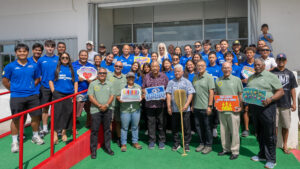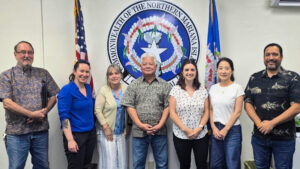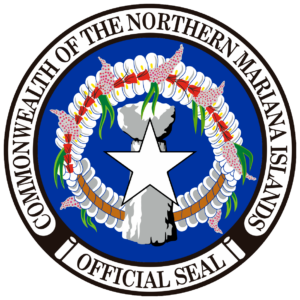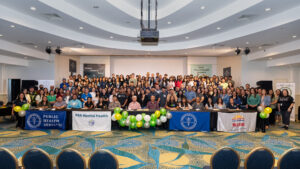Wearing masks and “Do-It-Yourself” (DIY) face coverings has been a hot topic since the start of the COVID-19 pandemic. On April 3, 2020, the US Centers for Disease Control and Prevention (CDC) released guidance on wearing non-medical cloth face coverings in public areas where other social distancing measures are difficult.
There is a global shortage of personal protective equipment including medical/surgical masks for many healthcare and frontline workers. If you are not sick or taking care of someone who is sick, please avoid buying or using medical/surgical masks in a general community setting. We need to save these supplies for those who need it most, including our CNMI healthcare and frontline workers who are working to protect us from COVID-19, and are at higher risk of exposure to the disease.
The Governor’s COVID-19 Task Force and Commonwealth Healthcare Corporation would like to inform the public that wearing a face mask or covering is not mandated by the Governor’s Executive Orders, however, some private businesses have elected to make face covering required for entry into their establishments.
Individuals are infectious before exhibiting symptoms of COVID-19, which may take several days after initial infection. Some individuals may never experience symptoms of the virus, but could still pass it on to others. Wearing a face covering in a community setting may protect those around you from becoming infected from you, even if you do not show symptoms.
Face coverings may help you to remember to not touch your face. Touching your eyes, nose and mouth with unclean hands is an easy way for the virus to enter your body, so avoiding face touching is a powerful step you can take for protection. Sometimes, however, wearing a face covering may increase the likelihood that you touch your face to adjust your face covering. Avoid adjusting your face covering.
Furthermore, wearing a face covering may have the effect of giving you a false sense of security, which might cause you to wash your hands less often or go to public places more often. If you wear a face covering, do not stop taking other important protective measures, such as regular hand washing and staying home as much as possible.
Please stay home; if you must leave your home and decide to use a face mask or covering, it is only effective if done properly.
How to properly use a DIY face covering:
· Before putting on a face covering, clean hands with alcohol-based hand rub or soap and water for 20 seconds.
· Avoid touching the mask while using it. If you do, clean your hands with alcohol-based hand rub or soap and water for 20 seconds.
· To remove the face covering, be careful not to touch your eyes, nose, and mouth when removing the face covering. If possible, remove it from behind (do not touch the front of mask). Clean your hands after removing the face covering with alcohol-based hand rub or soap and water for 20 seconds.
· DIY face coverings should be washed regularly, depending how often you use it. You can wash cloth face coverings in the washing machine.
How to properly use a face mask:
· Before putting on a face covering, clean hands with alcohol-based hand rub or soap and water for 20 seconds.
· Cover your mouth and nose with mask and make sure there are no gaps between your face and the mask.
· Avoid touching the mask while using it. If you do, clean your hands with alcohol-based hand rub or soap and water for 20 seconds.
· Single use face masks should not be shared with others
· To remove the face covering, be careful not to touch your eyes, nose, and mouth when removing the face covering. If possible, remove it from behind (do not touch the front of mask). Clean your hands after removing the face covering with alcohol-based hand rub or soap and water for 20 seconds.
STAY AT HOME, STOP THE SPREAD
The Governor’s COVID-19 Task Force and CHCC would also like to remind the public that the best way to protect yourself and others from COVID-19 and other illnesses is to practice:
Social distancing, which means avoiding close contact with people in order to avoid catching the virus yourself and to avoid passing it on.
● Stay home as much as possible. Avoid unnecessary travel or public places.
● Avoid social gatherings in groups of more than 10.
● Avoid eating out at restaurants. Use drive-thru, take-out, or delivery options.
● Only a healthy adult from the household should run nsecessary errands, such as getting groceries or picking up medications. Leave children, elderly, and other vulnerable people at home as much as possible. When returning home from an errand, wash your hands before doing anything else.
● Older adults and people with chronic medical conditions are at higher risk of getting very sick from this illness. People at high risk should stay at home as much as possible.
● Create a household plan of action https://www.cdc.gov/coronavirus/2019-ncov/prepare/checklist-household-ready.html
● Ensure 30-day supply of all medicines.
Continue good hand hygiene:
· Wash your hands for at least 20 seconds with soap and water, avoid touching your face, cover coughs and sneezes with a tissue or your sleeve.
Know the signs and symptoms of COVID-19 and what to do if you become symptomatic:
● Stay home when you are sick and if you recently traveled to a place with COVID-19. Self-quarantine means:
○ Choosing a room in your house that can be used to separate sick household members from others.
○ Washing your hands often with soap and water for at least 20 seconds. If soap and water are not available, use an alcohol-based hand sanitizer.
○ Avoiding touching your eyes, nose, and mouth with unwashed hands.
○ Limiting visitors
The CHCC appreciates the patience and understanding of the community at this time. To obtain information about COVID-19, please reach out to the COVID-19 Infoline at the following numbers: 285-1542/1672/1352/1854 These numbers are available Monday to Sunday 7:30AM-8:00PM
For mental health support and helpful tips during a crisis please call the Mental Health Care Line at 285-1856/1857 These numbers are available Monday to Friday 7:30AM-4:30PM.
For more information about DIY face coverings, please visit https://www.cdc.gov/coronavirus/2019-ncov/prevent-getting-sick/cloth-face-cover.html
For more information about CHCC programs, please follow us on Facebook, Instagram, Twitter at @cnmichcc, check out our website at www.chcc.gov.mp or call us at (670) 234-8950.
This health advisory may be found online at http://www.chcc.gov.mp/pressrelease.html
CHCC Point of Contact:
Janet Guerrero / Portia Tomokane
(670) 234-8950 Ext. 3416
Governor’s COVID-19 Task Force Point of Contact:
Kevin Bautista
covid-19@gov.mp





